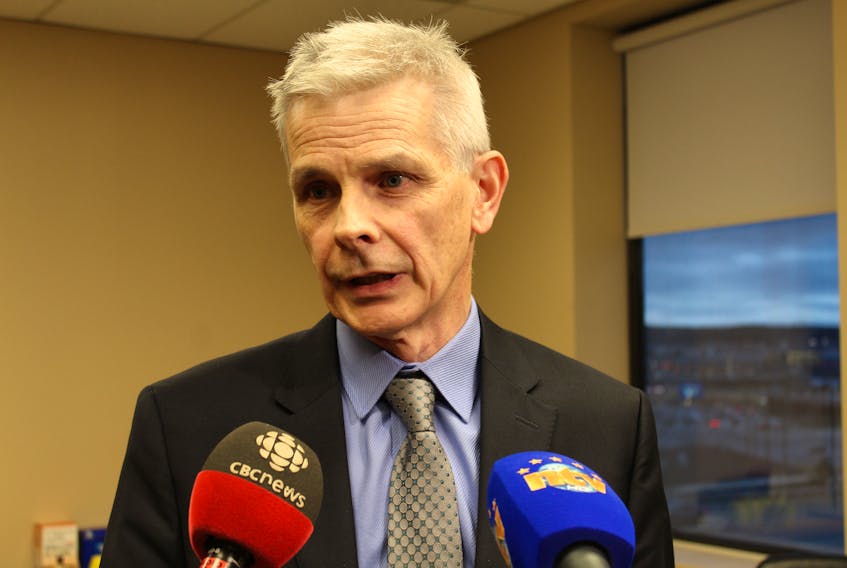“You’ve got to accentuate the positive
Eliminate the negative
Latch on to the affirmative
Don’t mess with Mister In-Between” — Bing Crosby, “Ac-Cent-Tchu-Ate the Positive”
I lay awake Wednesday night as the wind shrieked and roared in turns, slamming full force against the bedroom window and then wheeling away, only to return again and again, like a drunk determined to start a racket.

It went on for hours, with trees jerking and flapping in the wind like marionettes being manipulated by a particularly cruel puppet-master.
And I thought about the Muskrat Falls project and how easy it was for the government and Nalcor to push it through, even in the face of dogged media scrutiny and questions from determined and outspoken opponents.
And that’s because Nalcor and the government worked in lockstep, carefully crafting and repeating the same messages in order to downplay risks and emphasize the benefits.
Former clerk of the Executive Council Robert Thompson testified at the inquiry this week, saying that while Nalcor Energy executives and government officials worked together, politicians regularly went to the table with tough questions, prepared to push back at Nalcor’s assertions.
Recalling those days before the project was sanctioned, the only pushback I recall from politicians was directed at the members of the public who dared question it.
The government and Nalcor both seemed determined to get the project done — perhaps for different reasons; so much so that the government seemed to accept Nalcor’s facts and figures, without always getting independent verification.
As the evidence shows, the government and Nalcor often worked together to spin the project in the best possible way, even though Nalcor was proprietary with its PowerPoint slides and neglected to share certain strategic risk information with government members of the “team.”
Sometimes Nalcor would suggest communication strategies for the government, and other times the government would offer Nalcor tips on selling the project to the public, like an old married couple who starts and finishes each other’s sentences.
In fact, assured that the folks at Nalcor were world-class experts who could “stand shoulder to shoulder with any other energy corporation in the world,” as Dunderdale once put it, the government seemed to see what it wanted to see and hear what it wanted to hear.
Emailing Nalcor CEO Ed Martin in 2012, Thompson — a top civil servant expected to be bias-free — offered thoughts on how Martin could explain why Nalcor was awarding contracts early, before the project was even sanctioned.
“Pre-sanction expenditures are certainly at risk if the project is cancelled,” he wrote, “but reasonable early expenditures are prudent given our confidence in the project and in order to maintain project schedule. … Should a year be lost from the project schedule, the consequences include $xxx million extra cost to ratepayers and possible loss of key project personnel. These are significant consequences that we should take reasonable steps to avoid.”
Too bad that didn’t work out.
And, as has been reported, Nalcor advised the province to “leverage” the province’s long-simmering antipathy towards Quebec in its communications — advice that Thompson acknowledged was “going too far” for a Crown corporation, but then chaulked it up to “distribution of workload.”
Of course, Premier Kathy Dunderdale obligingly whipped out the jingoism card.
In 2012, Thompson offered “a few extra thoughts” for a speech the premier would give to the Nalcor board of directors — including that the premier emphasize the government “won’t be deterred on (Muskrat Falls) by detractors pursuing narrow and petty agendas.”
In a report later that year, Nalcor advised that “silent” supporters be encouraged to speak out in support of the project.
The public, of course, might have been forgiven for thinking the government was carefully scrutinizing Nalcor’s rationale and numbers and timelines, to ensure taxpayers’ best interests were being protected.
In fact, assured that the folks at Nalcor were world-class experts who could “stand shoulder to shoulder with any other energy corporation in the world,” as Dunderdale once put it, the government seemed to see what it wanted to see and hear what it wanted to hear.
As I write this, outside the wind still howls, and economist Wade Locke’s fateful words from 2012 swirl inside my head: “So, it is unlikely that the debt implications of Muskrat Falls will create an extra burden on the taxpayers.”
Recent columns by this author
PAM FRAMPTON: Sorry seems to be the hardest word
PAM FRAMPTON: Inquiry intrigue — was their string-pulling afoot?
Pam Frampton is a columnist whose work is published in The Western Star and The Telegram. Email [email protected]. Twitter: pam_frampton









